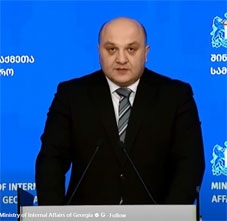
Dozens Detained in Tbilisi as Georgia Enforces New Protest Restrictions
By Liza Mchedlidze
Monday, October 20, 2025
Tbilisi police detained more than a dozen people during rallies on Rustaveli Avenue on October 19, just days after Georgia's new protest restrictions came into effect. The arrests marked one of the first major tests of the tightened rules, which replaced fines with short-term detention for blocking roads, wearing masks, and other protest-related acts.
The Interior Ministry announced that 27 participants from the previous night's demonstration outside parliament had been identified. Fourteen were taken into custody, while the others are awaiting administrative hearings. "If they repeat such violations, they will face criminal charges," Deputy Interior Minister Aleksandre Darakhvelidze warned at a briefing.
Police accused demonstrators of disrupting traffic by deliberately blocking the central avenue. Witnesses said the protest briefly cleared before resuming later in the evening, prompting officers to stop people nearby, check documents, and confiscate face coverings allegedly used during the rally.
Among those detained was well-known journalist and news anchor Vakho Sanaia of Formula TV. His channel said he was likely arrested for blocking a road and accused the authorities of targeting independent media. "This is not just about one journalist," Formula said in a statement. "It's about silencing critical voices in an increasingly repressive environment." The network demanded Sanaia's release and called for international support.
Other detainees reportedly include activists and opposition figures such as Nino Svanidze, Lara Nachkebia, Levan Margiani, Levan Jobava, Saba Khomeriki, Vakho Machavariani, Davit Gogichaishvili, Shalva Chubinidze, Tornike Tkhilava, and Lasha Chkhartishvili. Tkhilava was later released with a verbal warning, while court decisions for the others are pending.
The arrests follow a series of amendments passed by parliament last week that allow up to 15 days of detention for protest-related offenses and introduce prison terms of up to one year for repeat violations. Government officials argue the changes are needed to maintain order, but critics say they are aimed at suppressing dissent.
The daily rallies on Rustaveli Avenue have continued for more than 320 days, beginning after the ruling Georgian Dream party announced in late 2024 that it would suspend efforts toward European Union integration. Protesters say the movement symbolizes their commitment to democratic values and opposition to the government's turn away from the West.
Rights organizations condemned the latest detentions, saying the government is using the law to criminalize peaceful assembly. Watchdogs also warned that the arrests of journalists signal a growing threat to free expression ahead of Sunday's meeting of the EU Foreign Affairs Council, which is expected to discuss Georgia's democratic backsliding and pressure on the media.

